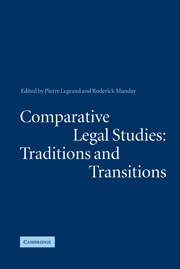Book contents
- Frontmatter
- Contents
- List of contributors
- Introduction
- Comparative legal studies and its legacies
- Comparative legal studies and its boundaries
- 6 Comparatists and sociology
- 7 Comparatists and languages
- Comparative legal studies and its theories
- Comparative legal studies and its futures
- Conclusion
- Index
7 - Comparatists and languages
Published online by Cambridge University Press: 18 December 2009
- Frontmatter
- Contents
- List of contributors
- Introduction
- Comparative legal studies and its legacies
- Comparative legal studies and its boundaries
- 6 Comparatists and sociology
- 7 Comparatists and languages
- Comparative legal studies and its theories
- Comparative legal studies and its futures
- Conclusion
- Index
Summary
Introduction
The shock experience
Comparative law is without a doubt the most promising part of modern jurisprudence. Josef Kohler (1849–1919) saw comparative law as jurisprudence's ‘bloom’ and ‘blossom’. This great lawyer-artist, an exuberant Catholic inspired by metaphor, made the statement at the 1900 Paris Congress. Kohler came from a French-law background and loved the cultural study of law, regarding it as a way to reconstruct legal scholarship.
Comparative law looks deceptively simple to some. But the reality of comparative analysis for those who actually do it is very different. Comparative law provides the ultimate shock experience for any nationally trained and conditioned lawyer. It throws him into confusion by taking away all language-based feelings of security about understanding the world. The result is a loss of control.
Comparing
My subject-matter is a classic example of this shock experience as the difficulty begins with the two words ‘comparatists’ and ‘languages’. Language has occupied the central place for comparatists. My title seems to assume that there is a kind of vital connection between the two terms. This might be so but what do these words mean? Starting with the first term, ‘comparatists’, there is a long string of questions to be asked about our status and activities as comparatists. Are we actually comparatists? Do we really compare? What can we compare?
- Type
- Chapter
- Information
- Comparative Legal Studies: Traditions and Transitions , pp. 154 - 194Publisher: Cambridge University PressPrint publication year: 2003
- 5
- Cited by



